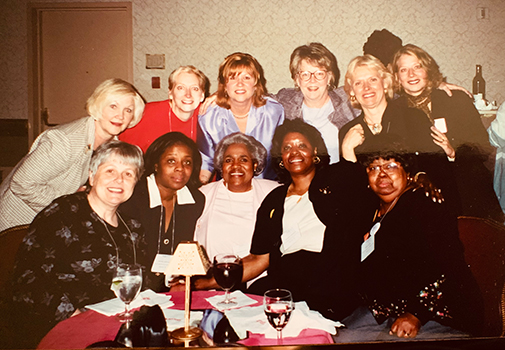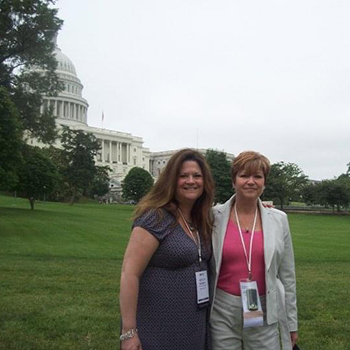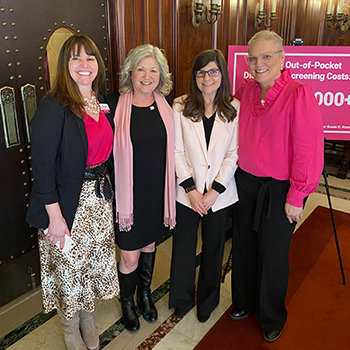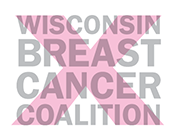 WBCC Involvement
WBCC Involvement
Volunteer (1994–99 and 2015–present)
Board Member and Board President (1999–2005)
Executive Director (2006–2015)
Past Chair, State Policy and Rare Chair Affair Committees
Current Member, Communications and Policy Committees
Represented the WBCC with the National Breast Cancer Coalition as a Team Leader, Project LEAD graduate, Alternate Board Member and Wisconsin Action Plan Coordinator for Breast Cancer Deadline 2020.
Represented the WBCC on the Breast Cancer and the Environment Research Program (2012–15), the Wisconsin Comprehensive Cancer Control Program, the Wisconsin Breast Cancer Taskforce, the Breast Cancer Research Advisory Network at the University of Wisconsin Carbone Cancer Center, and the Wisconsin Cancer Council.
Woman of Commitment Award from the Wisconsin Alliance for Women’s Health (2015)
Lifetime Achievement Award from the WBCC (2019)
When did you first become a part of the WBCC? What were your reasons for joining the organization?
In 1994, WBCC founder Linda Kohlenberg Irwin approached me when I was chairing an American Cancer Society Relay for Life in Whitefish Bay. She told me about the newly formed WBCC and asked if she could leave some literature at our registration tent. My mother had recently completed her first surgery and treatments for breast cancer and my grandmother was also fighting the disease in Ohio. We stayed in touch and I helped out tabling for WBCC at events and on communications outreach. My mother and grandmother subsequently passed away in late 1994 and early 1995; so, when my commitments on the local ACS board concluded, I decided to narrow my focus to breast cancer and joined the WBCC Board of Directors.
What do you consider the most significant achievements of the WBCC?
Building a legislative advocacy network! Other local breast cancer groups have different missions — we worked hard to build a legislative alert network across the state and engage those advocates to work for change. This network has been key to most of our successes: securing state and federal research funding, ensuring access to screening and treatment for all women regardless of insurance status, putting environmental protections in place to protect girls and women from chemicals of concern and much more.
What are the two or three most important contributions you have made to the WBCC?
I’m very proud to have helped establish the Rare Chair Affair in 2000, which raised hundreds of thousands of dollars for WBCC over the years; to have helped establish and organize our first annual State Advocacy Day in 2007; and to have helped develop both the “Beyond the Pink Ribbon”® Advocacy Trainings and presentations on environmental links to breast cancer development. I conducted both of those programs around the state and am excited to bring back the “Beyond the Pink Ribbon”® trainings later this year.
What challenges has the WBCC faced in its history? What challenges do you see the organization facing in the future?
I think with any small nonprofit organization it’s finding balance between resources (financial and human) and all the good work we want to do! Hitting that sweet spot, where you have enough of both resources, is a constant challenge. Also, over the last decade or so, political work has gotten much more difficult and divisive. It’s harder to get people to overcome their political apathy, or reluctance to “get involved,” and it’s harder to capture and keep the ears of our policy makers — but we have to continue to STAND UP AND SPEAK OUT.
Who are two or three members of the WBCC who should be recognized as part of the organization’s history? Why are they important?

Absolutely Kathleen Harris, a co-founder, past president and mentor to me and so many others! Her commitment to WBCC has been unwavering over all 30 years of our existence. We’ve all learned so much from her. Mildred Leigh Gold, whom we lost in 2009, was another woman I considered a mentor when I joined WBCC’s Board. She was kind, strong, but charming as all get out, and dedicated to helping women navigate breast cancer. Finally, Jean Rosenberg. Jean handled our membership lists, mailings and event registrations for over 15 years as a volunteer. She learned how to do a mail merge and manage our databases when she was over 80! She was our organizational glue and I adored her. We lost Jean in 2017. All three of these women were committed to the WBCC during our early years and beyond; they exemplified dedication to the cause as we went through the inevitable growing pains of a newer organization and as we evolved into an important voice for the breast cancer community.
What has your involvement with the WBCC meant to you?
It’s been therapeutic. Heartbreaking. Inspiring. Challenging. Rewarding. All of it — it’s been a huge part of most of my adult life. There’s no way to explain how much I’ve learned: about advocacy, lobbying, the science of breast cancer, running a nonprofit. These are things that were never in my wheel house, but the cause has become central to who I am. I’ve made so many good friends and gone to way too many funerals. We’ve shared incredible highs and there were times I wanted to just quit and run away. I don’t think I can verbalize it all, but in 2009 I got a tattoo of a pink ribbon in the shape of an open heart and that’s as close as I can get to explaining it. WBCC has opened my heart to it all — the joy and the loss inherent in being so involved in the breast cancer community.
Anything else you’d like to share?
I will be forever grateful for the friendship of so many women who I’ve come to know, work with, learn from and admire over the years. The work continues — too many women are still dying of breast cancer. More and more young women are being diagnosed with breast cancer. Disparities in access and treatment have to be addressed. We will always need support from our community — more dedicated volunteers, more donors — to enable us to continue into the future.


Dawn (right) and her sister Kelly Herda at the NBCC Advocate Leadership Summit and Lobby Day, c. 2010
Nikki Panico (State Executive Director – Wisconsin, Susan G. Komen), Dawn, Dana Carter (Regional Manager State Policy & Advocacy, Susan G. Komen) and advocate Gail Zeamer in Madison on February 21, 2023, for the introduction of new state breast cancer screening legislation.
(June 2024)
